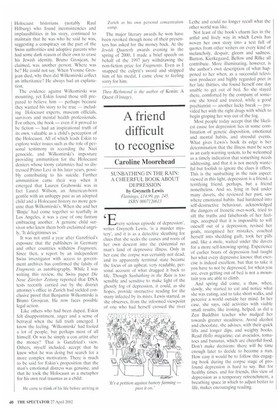A friend difficult to recognise
Caroline Moorehead
SUNBATHING IN THE RAIN: A CHEERFUL BOOK ABOUT DEPRESSION by Gwyneth Lewis Flamingo, £14.99, pp. 245, ISBN 0007120613
very serious episode of depression', writes Gwyneth Lewis. 'is a murder mystery', and it is as a detective sleuthing for clues that she seeks the causes and roots of her own descent into the existential no man's land of depressive illness. Only in her case the corpse was certainly not dead, and its apparently terminal state became the focus of an upbeat, very readable, personal account of what dragged it back to life. Though Sunbathing in the Rain is too sensible and sensitive to make light of the ghostly fog of depression, it could, as she hopes, provide instructive reading for the many infected by its mists. Lewis started, as she observes, from the informed viewpoint of one who had herself crossed the river Lethe and could no longer recall what the other world was like.
Not least of the book's charm lies in the artful and lively way in which Lewis has woven her own story into a text full of quotes from other writers on every kind of melancholy, despair, gloom and sadness. Burton, Kierkegaard, Bellow and Rilke all contribute. More illuminating, however, is the author's own description of what happened to her when, as a successful television producer and highly regarded poet in her late thirties, she found herself one day unable to get out of bed. So she stayed there, comforted by the company of someone she loved and trusted, while a good psychiatrist — another lucky break — provided her with the right drugs with which to begin groping her way out of the fog.
Most people today accept that the likeliest cause for depression lies in some combination of genetic disposition, emotional and mental habits, and stressful events. What gives Lewis's book its edge is her determination that the illness must be seen as an early warning system. to be welcomed as a timely indication that something needs addressing, and that it is not merely wasteful but foolish to ignore the clues it offers. This is the sunbathing in the rain aspect: viewed in this light, depression is a friend, a terrifying friend, perhaps, but a friend nonetheless. And so, lying in bed under many duvets, she reviewed her past, saw where emotional habits had hardened into self-destructive behaviour, acknowledged the dangers of frenetic over-work, tried to sift the truths and falsehoods of her feelings, accepted that it is impossible to will oneself out of a depression, revised her goals, recognised her mistakes, coached herself into shedding guilt, took her pills and, like a mole, waited under the duvets for a more self-knowing spring. Experience of earlier bouts of depression had taught her what every depressive knows: that exercise is indeed excellent, but that to take it you have to not be depressed, for when you are, even getting out of bed is not a mountain you are able to climb.
And spring did come, a thaw, when, slowly, she started to eat and notice what she was eating, and to take short walks, and perceive a world outside her mind. In her case, she says, odd activities with visible small results, like ironing, helped, as did a Zen Buddhist teacher who nudged her towards greater steadiness. Avoid alcohol and chocolate, she advises, with their quick lifts and longer dips, and weighty books. Read Hello magazine; eat avocados, tomatoes and bananas, which are cheerful food. Don't make decisions: there will be time enough later to decide to become a nun. How easy it would be to follow this engaging book during the corpse stage of profound depression is hard to say. But for healthy times, and for friends, this view of depression as a temporary retrenchment, a breathing space in which to adjust better to life, makes encouraging reading.


































































 Previous page
Previous page